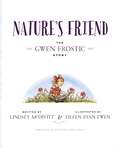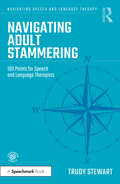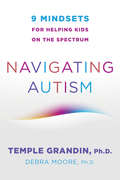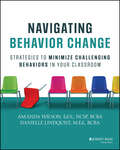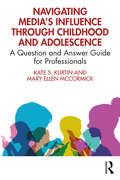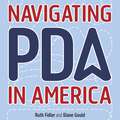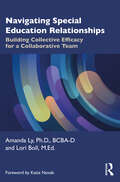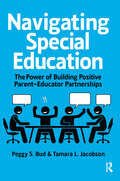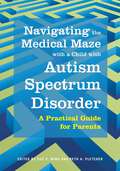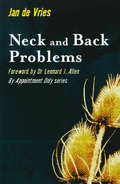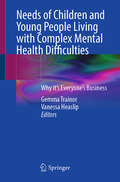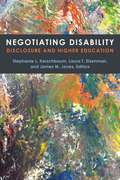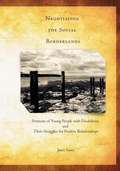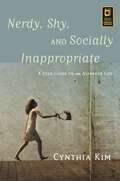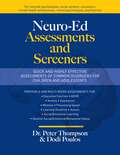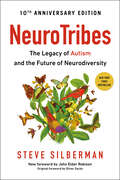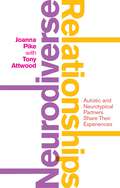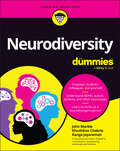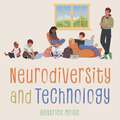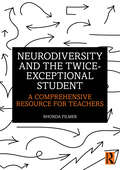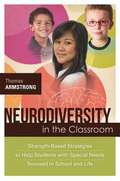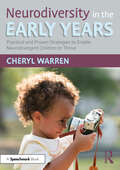- Table View
- List View
Nature's Friend: The Gwen Frostic Story
by Lindsey McDivittGwen Frostic sought solace in art and nature. She learned to be persistent and independent - never taking no for an answer or letting her disabilities define her. An artist and business owner, Gwen dedicated her work and her life to reminding people of the wonder and beauty in nature.
Navigating Adult Stammering: 100 Points for Speech and Language Therapists (Navigating Speech and Language Therapy)
by Trudy StewartThis book, the first in an exciting new series, provides speech and language therapy students and newly qualified and beginning stammering specialists with 100 key points that will help form a strong foundation for their work supporting adults and teenagers who stammer. Composed of practical, relevant and useful advice from an experienced clinician, chapters break advice down into sections which include information about the therapeutic relationship, therapeutic approaches and signposts to further resources. Throughout the book, comments from stammering specialists describe what they wish they had known at the start of their careers. This book: Puts the person who stammers at the heart of therapy, following the clinical choices they might make Is written in an accessible style, designed to be dipped in and out of as required Draws on the experience of therapists working with those who stammer Full of advice and guidance to support effective practice, this is an essential resource for anybody new to this client group.
Navigating Autism: 9 Mindsets For Helping Kids on the Spectrum
by Temple Grandin Debra MooreEmpowering strategies for anyone who works with children and teens on the spectrum. International best-selling writer and autist Temple Grandin joins psychologist Debra Moore in presenting nine strengths-based mindsets necessary to successfully work with young people on the autism spectrum. Examples and stories bring the approaches to life, and detailed suggestions and checklists help readers put them to practical use. Temple Grandin shares her own personal experiences and anecdotes from parents and professionals who have sought her advice, while Debra Moore draws on more than three decades of work as a psychologist with kids on the spectrum and those who love and care for them. So many people support the lives of these kids, and this book is for all of them: teachers; special education staff; mental health clinicians; physical, occupational, and speech therapists; parents; and anyone interacting with autistic children or teens. Readers will come away with new, empowering mindsets they can apply to develop the full potential of every child.
Navigating Behavior Change: Strategies to Minimize Challenging Behaviors in Your Classroom
by Amanda Wilson Danielle LindquistA master class in preventing challenging student behavior with confidence Navigating Behavior Change is a book for all the teachers and school professionals who struggle with the constant cycle of reacting to student behavior. This guide outlines universal practices which should be in place within every classroom to prevent challenging behaviors before they start. When students are focused and ready to learn, educators can do the important work of teaching. In this book, school psychologist Amanda Wilson and special educator Danielle Lindquist help you build your skill set, so you can create an environment where students are regulated and motivated to learn. Inside, you'll find a comprehensive framework of components that you can implement in any K-12 classroom to prevent challenging behaviors and increase student engagement. Understand the influence of executive functions, missing skills, and motivation on student behavior Learn the core components of classroom management, including class structure and high-leverage instructional practices Effectively and meaningfully embed reinforcement to increase student motivation Learn how to effectively respond to challenging behaviors to assist students in de-escalating and re-engaging Manage your classroom in a trauma-informed way that maintains student dignity This book will help K-12 teachers, special education teachers, school counselors, and other service providers, instructional coaches, and administrators of students with behavior challenges. Take a proactive approach to behavior and help students so you can spend more time teaching and they can spend more time learning.
Navigating Media’s Influence Through Childhood and Adolescence: A Question and Answer Guide for Professionals
by Kate S. Kurtin Mary Ellen McCormickNavigating Media’s Influence Through Childhood and Adolescence moves through research and questions that are relevant to practicing pediatricians and therapists in their everyday practice. As we navigate post-pandemic life where screen time was unrestricted in most homes, this book has never been more important. Written by a pediatrician and a professor of media effects, this book is a vital resource for practicing mental health clinicians, counselors, psychologists, physicians, and students studying in those areas. Grounded in developmental theory, mass communication theory, current research, and acumen gained from years of clinical and teaching experience, this book gives professionals what they need to understand the colossal effect media is having on their patients. An aid to practitioners, this book is organized by developmental stage and matches specific questions related to media’s effects with explicit research-based recommendations and explanations. It is intended to be a quick resource guide for the busy professional.
Navigating PDA in America: A Framework to Support Anxious, Demand-Avoidant Autistic Children, Teens and Young Adults
by Ruth Fidler Diane GouldAlthough Pathological Demand Avoidance (PDA) has been a recognized autistic profile in the UK for some time, awareness is still growing in America. When parents first learn about it they talk about having a lightbulb moment of understanding their child better. Many described how, having found traditional parenting and behavioral techniques made things worse instead of better, they felt judged and alone. Teachers and school administrators also reported struggling to support their PDA students. The children, teens and young adults themselves were often left feeling misunderstood.The authors of this book explain PDA with an emphasis on promoting well-being both for PDA individuals and all those who support them. They provide a neurodiversity-affirming framework for supporting anxious, demand avoidant individuals across a range of settings and services. As awareness spreads across the pond, the compassion and clarity in this book will become a valuable guide to many.
Navigating Special Education Relationships: Building Collective Efficacy for a Collaborative Team
by Amanda Ly Lori BollTold through a series of real-life stories and hard-learned lessons, Amanda Ly and Lori Boll share the challenges in special education relationships experienced through the lens of a special educator, a parent of a son with profound disabilities, and a child psychologist.Ideally, teachers, therapists, and parents working with students with special needs should form a cohesive team. However, these three parties often function as separate entities with different goals and objectives. Over the past 25 years, the authors have observed a consistent pattern of miscommunication and overlooking the importance of the mental and physical well-being of each team member, which contributed to poor collaboration. This book takes readers on a journey through the process of discovering whether you have, or are working with, a student with special needs; navigating how to best work with the student and other members of the team; and lastly, discussing ways to empower the reader and all members of the team. The authors posit that if we understand one another's perspectives, learn how to communicate more effectively, and focus on self-care, we will increase Collective Efficacy and become the collaborative team our students need us to be.As the first book to connect the concept of Collective Efficacy to special education, this is a must-read for teachers, therapists, and parents aiming to grasp the complexities of relationships in special education teams and better understand how mental health influences the effectiveness of each individual’s role.
Navigating Special Education: The Power of Building Positive Parent-Educator Partnerships
by Peggy Bud Tamara JacobsonThis timely and innovative roadmap for parents, educators, and administrators highlights the importance of effective communication methodology, appropriate correspondence, and data collection recommendations. Effective communication is often missing from the IEP team’s conversation. Navigating Special Education provides a foundation for building proactive, positive partnerships that will lead to 21st century best practices for children.The 5-C Model of Communication—Conversation, Collaboration, Cooperation, Compromise, and Consensus—presented in Navigating Special Education helps to forge trusted alliances between school districts and families.Navigating Special Education draws upon the authors’ 60-plus years of combined experience by using: Anecdotal, evidence-based, real-life scenarios Templates for letter writing and extensive data collection A user-friendly appendix and glossary As stakeholders, wouldn’t you like to have successful meetings where everyone’s voice is heard, respected, and understood? After reading Navigating Special Education, families, educational professionals, college students, and special education organizations will be able to implement effective models of communication and build positive partnerships.
Navigating the Medical Maze with a Child with Autism Spectrum Disorder: A Practical Guide for Parents
by Lisa Ford Julie O'Brien Jennifer Bain Mark D. Robinson Harumi Jyonouchi Jeffrey Kornitzer Caroline Hayes-Rosen Devorah Segal Sue Ming Beth Pletcher Tishi Shah Thomas Ballesteros Barbie Zimmerman-Bier Gary Mcabee Susan Brill Evan Spivack Susan Connors Iona MonterioThis comprehensive guide enables parents of children with an autism spectrum disorder (ASD) to play an active and effective role in their child's medical care from diagnosis to early adulthood. With a focus on working with health care providers to ensure the best treatment for your child's unique needs, it includes: - a description of the developmental and medical conditions faced by children with ASDs in lay terms - an explanation of common diagnostic tests - a presentation of conventional and alternative therapies and how they work - tips for managing day-to-day medical or behavioral problems - advice for parents considering enrolling their child in a research project - and all the latest medical information. This authoritative and accessible book provides parents of children with an ASD with the foundation of knowledge they need to become an active partner in the medical care of their child and the map that will allow them to navigate the complex medical world.
Neck and Back Problems
by Jan de VriesIn Neck and Back Problems Jan de Vries deals with many of the most common problems relating to the spine. Drawing on his own vast experience of helping patients overcome their suffering and on various case histories, this book contains practical advice for those millions who endure the agony of backache. Simple exercises and remedies are outlined, together with proven hints towards self-treatment. Slipped discs, tennis elbow, 'whiplash', bursitis and problems with vertigo are all discussed in layman's terms. Neck and Back is a veritable treasure trove of information from one of the world's leading practitioners in this field.
Needs of Children and Young People Living with Complex Mental Health Difficulties: Why it’s Everyone’s Business
by Vanessa Heaslip Gemma TrainorThis book highlights how it is increasingly important that nurses and other health and social care professionals working with or caring for children and young people (CYP) can contribute to the care and support these vulnerable individuals need. Given the limited specialist mental health services available for CYP, this book helps to recognise when referral to specialist services is required. It is aimed at providing nurses, other health and social care professionals with a comprehensive understanding of some of the complex mental health issues faced by young people today and to provide them with confidence in how to interact helpfully with them. While covering a range of complex mental health issues (such as self-harm, eating disorders, and psychosis) this book also explores wider factors that can influence poor mental health (such as being Looked After, having a disability, drugs and alcohol, and social media). Alongside these, it explores some of the wider systems and processes that can provide practical guidance to practitioners (having a Trauma-informed approach, awareness of risk management, and safeguarding). Lastly, the book recognises how overwhelming it can be for practitioners working in this field and explores how they can use reflective practice and self-care in the development of a therapeutic relationship that enables them to interact positively and non-judgementally with young people with complex mental health issues. Examples of good practice are provided throughout the book by using case scenarios and tips from young people with lived experience.This book will prove to be an invaluable guide to assist nurses, teachers, social workers, paramedics, health care assistants and police force in giving help and support to CYP.
Negotiating Disability: Disclosure and Higher Education
by Stephanie L Kerschbaum Laura T Eisenman James M JonesDisability is not always central to claims about diversity and inclusion in higher education, but should be. This collection reveals the pervasiveness of disability issues and considerations within many higher education populations and settings, from classrooms to physical environments to policy impacts on students, faculty, administrators, and staff. While disclosing one’s disability and identifying shared experiences can engender moments of solidarity, the situation is always complicated by the intersecting factors of race and ethnicity, gender, sexuality, and class. With disability disclosure as a central point of departure, this collection of essays builds on scholarship that highlights the deeply rhetorical nature of disclosure and embodied movement, emphasizing disability disclosure as a complex calculus in which degrees of perceptibility are dependent on contexts, types of interactions that are unfolding, interlocutors’ long- and short-term goals, disabilities, and disability experiences, and many other contingencies.
Negotiating The Social Borderlands: Portraits of Young People with Disabilities and Their Struggles for Positive Relationships
by Janet SauerThis book provides readers with narratives of the lives of three young people with significant disabilities. The author uses portraiture to narrate the stories of three young people and to capture the myriad dimensions of each unique individual. These portraits expose a balance between empirical description and aesthetic expression and provide a singular view into the nuances and complexities of each young person's life, while depicting their unique social contexts and how they fit within those milieux. Never losing sight of the dimensions of the selves of these notable young people and the contexts in which they exist, the author presents the qualitative techniques of inquiry she used to examine the complexities involved in the co-constructions of meaning among the young people and their communication partners. Without wavering, she explores their deep relationships and the contexts where positive reciprocal relationships developed between young people with disabilities and nondisabled people and how these relationships evolved from the perspectives of the participants. Negotiating the Social Borderlands, an unapologetic presentation of a remarkable set of portrait narratives, is written for a broad audience and, thus, offers an inherently complex and sensitive portrayal of three personal stories in which a variety of contextualized issues can be examined and discussed in light of each readers' practices, policies, and perspectives.
Nerdy, Shy, and Socially Inappropriate: A User Guide to an Asperger Life
by Cynthia KimCynthia Kim explores all the quirkyness of living with Asperger Syndrome (ASD) in this accessible, witty and honest guide looking from an insider perspective at some of the most challenging and intractable aspects of being autistic. Her own life presents many rich examples. From being labelled nerdy and shy as an undiagnosed child to redefining herself when diagnosed with Asperger Syndrome as an adult, she describes how her perspective shifted to understanding a previously confusing world and combines this with the results of extensive research to explore the 'why' of ASD traits. She explains how they impact on everything from self-care to holding down a job and offers typically practical and creative strategies to help manage them, including a section on the vestibular, sensory and social benefits of martial arts for people with autism. Well known in the autism community and beyond for her popular blog, Musings of an Aspie, Cynthia Kim's book is rich with personal anecdotes and useful advice. This intelligent insider guide will help adults with ASDs and their partners, family members, friends, and colleagues, but it also provides a fresh and witty window onto a different worldview.
Nerdy, Shy, and Socially Inappropriate: A User Guide to an Asperger Life
by Cynthia KimCynthia Kim explores all the quirkyness of living with Asperger Syndrome (ASD) in this accessible, witty and honest guide looking from an insider perspective at some of the most challenging and intractable aspects of being autistic. Her own life presents many rich examples. From being labelled nerdy and shy as an undiagnosed child to redefining herself when diagnosed with Asperger Syndrome as an adult, she describes how her perspective shifted to understanding a previously confusing world and combines this with the results of extensive research to explore the 'why' of ASD traits. She explains how they impact on everything from self-care to holding down a job and offers typically practical and creative strategies to help manage them, including a section on the vestibular, sensory and social benefits of martial arts for people with autism. Well known in the autism community and beyond for her popular blog, Musings of an Aspie, Cynthia Kim's book is rich with personal anecdotes and useful advice. This intelligent insider guide will help adults with ASDs and their partners, family members, friends, and colleagues, but it also provides a fresh and witty window onto a different worldview.
Nerdy, Shy, and Socially Inappropriate: A User Guide to an Asperger Life
by Cynthia KimCynthia Kim explores all the quirkyness of living with Asperger Syndrome (ASD) in this accessible, witty and honest guide looking from an insider perspective at some of the most challenging and intractable aspects of being autistic. Her own life presents many rich examples. From being labelled nerdy and shy as an undiagnosed child to redefining herself when diagnosed with Asperger Syndrome as an adult, she describes how her perspective shifted to understanding a previously confusing world and combines this with the results of extensive research to explore the 'why' of ASD traits. She explains how they impact on everything from self-care to holding down a job and offers typically practical and creative strategies to help manage them, including a section on the vestibular, sensory and social benefits of martial arts for people with autism.Well known in the autism community and beyond for her popular blog, Musings of an Aspie, Cynthia Kim's book is rich with personal anecdotes and useful advice. This intelligent insider guide will help adults with ASDs and their partners, family members, friends, and colleagues, but it also provides a fresh and witty window onto a different worldview.
Neuro-Ed Assessments and Screeners: Quick and Highly Effective Assessments of Common Disorders for Children and Adolescents
by Peter Thompson Dodi PoulosNeuro-Ed Assessment and Screeners are fast and effective assessment forms for busy mental health and educational professionals. These practical assessments were created by practitioners who know the needs of professionals working in the field. Th
NeuroTribes: The Legacy of Autism and the Future of Neurodiversity
by Steve SilbermanThis New York Times–bestselling book upends conventional thinking about autism and suggests a broader model for acceptance, understanding, and full participation in society for people who think differently.&“Beautifully told, humanizing, important.&”—The New York Times Book Review &“Breathtaking.&”—The Boston Globe &“Epic and often shocking.&”—Chicago Tribune WINNER OF THE SAMUEL JOHNSON PRIZE FOR NONFICTION AND THE CALIFORNIA BOOK AWARD What is autism? A lifelong disability, or a naturally occurring form of cognitive difference akin to certain forms of genius? In truth, it is all of these things and more—and the future of our society depends on our understanding it. Wired reporter Steve Silberman unearths the secret history of autism, long suppressed by the same clinicians who became famous for discovering it, and finds surprising answers to the crucial question of why the number of diagnoses has soared in recent years. Going back to the earliest days of autism research, Silberman offers a gripping narrative of Leo Kanner and Hans Asperger, the research pioneers who defined the scope of autism in profoundly different ways; he then goes on to explore the game-changing concept of neurodiversity. NeuroTribes considers the idea that neurological differences such as autism, dyslexia, and ADHD are not errors of nature or products of the toxic modern world, but the result of natural variations in the human genome. This groundbreaking book will reshape our understanding of the history, meaning, function, and implications of neurodiversity in our world.
Neurocognitive Rehabilitation of Down Syndrome
by Donna Spiker Jean-Adolphe Rondal Juan PereraDown syndrome is one of the most commonly occurring developmental disorders and it is now possible to conceptualize and define opportunities for neurocognitive rehabilitation for those with the condition. This book describes how early cognitive intervention in children with Down syndrome can be carried out, and can reduce, or compensate for, the major deficits characteristic of the condition. This comprehensive account relates the neurocognitive approach to the major therapeutic endeavors in the neighboring fields of neurogenetics, experimental environmental enrichment, molecular genetics, pharmacology, pediatrics and cardiology for infants with Down syndrome. Neurocognitive Rehabilitation of Down Syndrome provides the guidance required to establish effective rehabilitation programs, and is essential reading for developmental clinicians, pediatricians, neuropsychologists and other health professionals.
Neurodiverse Relationships: Autistic and Neurotypical Partners Share Their Experiences
by Joanna PikeComprised of the accounts of twelve heterosexual couples in which the man is on the Autism Spectrum, this book invites both partners to discuss their own perspectives of different key issues, including anxiety, empathy, employment and socialising. Autism expert Tony Atwood contributes a commentary and a question and answer section for each of the twelve accounts.The first book of its kind to provide perspectives from both sides of a relationship on a variety of different topics, Neurodiverse Relationships is the perfect companion for couples in neurodiverse relationships who are trying to understand one another better.
Neurodiversity For Dummies
by John Marble Khushboo Chabria Ranga JayaramanA quick and easy way to understand neurodiversity as written by neurodivergent people and our families Neurodiversity For Dummies is your essential guide in understanding neurodivergent conditions like autism, ADHD, dyslexia, and more. This quick and easy guide is perfect for anyone needing to know more about neurodiversity. And that’s all of us—because recent estimates say that 15-20% of the world’s population have some form of neurodivergence. Your life is filled with neurodivergent people that you know and love, whether you realize it yet or not. It’s time to learn to support and include the neurodivergent among us, and to understand how neurodiversity impacts society and the workplace. This is for the neurodivergent person wanting to thrive in life, for parents and caregivers seeking success for their child, and for teachers who are working to make a difference in their students’ lives. Filled with practical advice, Neurodiversity for Dummies also provides a helping hand to service providers, assistance for workplace managers and colleagues, and understanding for family members and friends. Imagine a world where we all understood ourselves better and appreciated more deeply the differences in others. No matter how your own brain thinks, Neurodiversity for Dummies is for you. Check out this jargon-free introduction for an essential overview. Explore the Spectrum of Neurodiversity: Understand in plain language the world of autism, ADHD, dyslexia, and other neurodivergent conditions. Unlock Hidden Talents: Move yourself beyond common myths and misconceptions to discover how neurodiversity actually works. Learn how neurodiversity has always been with us, why society needs neurodivergent traits, and how neurodiversity can be a wellspring of innovation, creativity, and out-of-the-box thinking. Discover Yourself: Whether you are a neurodivergent person or not, learn how to understand your own normalcy, advocate for your needs, and build meaningful connections with those who think and experience the world differently than you. Change the World Around You: Be empowered through simple steps you can take to create inclusive environments for neurodivergent individuals in your school or workplace. Uncover proven strategies that cultivate a culture of acceptance and respect, where the unique perspectives of all individuals are valued and celebrated. We believe in providing parents with better supports, empowering individuals with information, and shaping a world where we are all seen and understood. With an author team composed of neurodivergent individuals and parents writing together, Neurodiversity for Dummies is an example of the power of neurodiversity when put into action. It’s why we wrote this for you. Don’t miss your chance to embark on this transformative journey. Order your copy of Neurodiversity for Dummies now to better understand yourself and others, and to join the movement that is revolutionizing how we understand and support the diversity of the human mind.
Neurodiversity and Technology: Neuroscience-led strategies for parents
by Bea MoiseHow do I set appropriate technology boundaries with my neurodivergent child?What is the relationship between screen time and meltdowns?How can I best help my child transition in and out of screen use without dysregulating?Appropriate technology use is a huge issue for many parents, especially those with neurodivergent children.Beatrice Moise, neurodivergent author, mother to neurodivergent children and parent-expert for NBC, is here to provide practical, non-judgemental advice on engaging with technology in a positive way. Drawing on her own lived experience, this parental survival guide helps you unpick the relationship between screen time and behaviour, reinforce positive behaviours, and draw boundaries when needed.
Neurodiversity and the Twice-Exceptional Student: A Comprehensive Resource for Teachers
by Rhonda FilmerWritten for busy teachers, this practical manual defines terms, shares examples and provides evidence-based information and strategies to support the teaching of twice-exceptional students. Providing a comprehensive blueprint in an easy-to-use format, this book explains classroom techniques for differentiation with tips and advice based on research and teacher experience. The topics covered include learning disabilities, gifted and high potential education, talent development and general classroom pedagogy involving curriculum differentiation and individualised programming. It also explains, in more depth, the varying presentations of neurodiversity in the form of specific learning disabilities, autism and attention deficits in the gifted/high potential student to enable teachers to acquire more knowledge of the nuances evident in each twice-exceptional student. Case studies capture the perspectives of twice-exceptional young people who have thrived, and the book provides weblinks to a very comprehensive list of helpful, freely-available resources.This essential, practical resource will serve teachers and educators in both primary and secondary schooling, as well as pre-service educators. It will also be of interest to parents and carers.
Neurodiversity in the Classroom: Strength-Based Strategies to Help Students with Special Needs Succeed in School and Life
by Thomas ArmstrongA new concept on human diversity has emerged over the past 10 years that promises to revolutionize the way educators provide services to students with special needs: neurodiversity. Just as we celebrate diversity in nature and cultures, so too do we need to honor the diversity of brains among our students who learn, think, and behave differently. In Neurodiversity in the Classroom, best-selling author Thomas Armstrong argues that we should embrace the strengths of such neurodiverse students to help them and their neurotypical peers thrive in school and beyond. This innovative book focuses on five categories of special needs: learning disabilities, attention deficit hyperactivity disorder, autism, intellectual disabilities, and emotional and behavioral disorders.
Neurodiversity in the Early Years: Practical and Proven Strategies to Enable Neurodivergent Children to Thrive
by Cheryl WarrenHow we support children in their early years to understand, to be accepted for their unique differences and to thrive, has a life-long impact. With a neuro-affirming, strength-based narrative running throughout, this accessible book will improve your knowledge, skillset and practical application of high-quality neuro-inclusive practice.In exploring the best practice to assist young neurodivergent children navigating the world, these eight succinct chapters will: Explore key topics, including how to create an environment to enable children to feel safe in your space Provide advice on how to work in a connective partnership with parents to enable a family to thrive, and how to create a whole setting approach to neuro-inclusion Include a range of first-hand accounts and case studies to bring theory to life Suggest a wealth of strategies that can be easily applied and will ensure that all children feel safe, connected and can achieve Neurodiversity in the Early Years enables the reader to embrace and embed knowledge and to advocate for a change which will provide neurodivergent children with the foundations of belonging, acceptance and a celebration of who they are. It will be key reading for all early years educators working with children from 2 to 5 years old.
